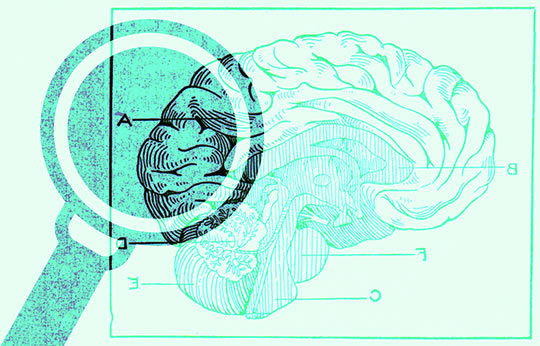Psychology in Brief: 6 Things We Didn’t Know Last Week

Make kids eat veg–How to be happy–Women sidestep maths stereotypes–Exercise protects brain from stress–The secrecy heuristic–Creative power of death.
Six things we didn’t know last week from the world of psychology:
1. Make kids eat veg
The answer to getting kids to eat more veg, according to this study, is to have them read specially designed books on nutrition:
“These children […] more than doubled their voluntary intake of vegetables during snack time after the three-month intervention, whereas the amount that the control group ate stayed about the same.”
The books even outperformed more traditional approaches:
“When the conceptual program was pitted against a more conventional teaching strategy focused on the enjoyment of healthy eating and trying new foods, the results showed that both interventions led to increased vegetable consumption. Yet, the children in the conceptual program showed more knowledge about nutrition and a greater overall increase in vegetable consumption.”
2. How to be happy
What can we do to make ourselves happier? Some standard answers to this age-old question are in this BBC article which rounds up research from the World Happiness Database. Here are a few of the more eye-catching facts:
- Men tend to be happier in a society where women enjoy greater equality.
- Being considered good looking increases men’s happiness more than it does women’s.
- You tend to be happier if you think you’re good looking, rather than if you actually, objectively speaking, are.
- Having children lowers your happiness levels, but your happiness increases when they grow up and leave home.
For a more nuanced response, check out this Psychology Today article which praises being curious, finding meaning, celebrating success, taking risks and even embracing negative emotions:
“Happy, flourishing people don’t hide from negative emotions. They acknowledge that life is full of disappointments and confront them head on, often using feelings of anger effectively to stick up for themselves or those of guilt as motivation to change their own behavior. This nimble mental shifting between pleasure and pain, the ability to modify behavior to match a situation’s demands, is known as psychological flexibility.”
3. Women sidestep maths stereotypes
Neat research reported by the BPS Research Digest suggests women can get better at maths by pretending to be someone else. It’s all about sidestepping the stereotype that women are worse then men at maths:
“Overall, men outperformed women on the maths task. But women who took the test under someone else’s name, be it male or female, performed better than women who performed under their own name, and they did just as well as the men. The effect was stronger for women who cared more about maths.”
It would be interesting to see if the same effect held true for other types of stereotypes as well. Also, can we avoid our bugbears by pretending to be someone else?
4. Exercise protects brain from stress
A study on mice suggest another advantage of exercise: it makes the brain more resilient to stress. When researchers compared ‘runner’ mice with lazy-old-sit-around-the-house-doing-nothing-all-day-long-mice, they found that:
“…when mice allowed to exercise regularly experienced a stressor — exposure to cold water — their brains exhibited a spike in the activity of neurons that shut off excitement in the ventral hippocampus, a brain region shown to regulate anxiety.”
5. The secrecy heuristic
In a week when secret information once again hit the headlines, the NYT has a piece explaining the psychological shortcut or ‘heuristic’ that we tend to overvalue secret information. Psychological studies show that we automatically assume that information which is secret is more useful, important and accurate, although this isn’t necessarily the case.
“There are several reasons people might inflate the value of secret information. Sometimes, of course, secret information is genuinely of higher quality and affords real strategic advantage over public information. With that in mind, people may overgeneralize about the association between secrecy and quality to contexts where it is unwarranted.”
Which means that:
“If people exaggerate the value of secret information, they may too readily cede privacy in the interest of national security, even if they value that privacy highly.”
6. The creative power of death
If you’ve ever struggled to come up with a humorous caption for a cartoon or photo then perhaps what you need is an unconscious reminder of your own mortality. A new study had people trying to caption a cartoon from The New Yorker. The results suggested that:
“The captions written by individuals who were subconsciously primed with the word death were clearly voted as funnier by the jury. By contrast, the exact opposite result was obtained for the students who consciously wrote about death: their captions were seen as less humorous.”
But why is that?
“[a] substantive body of work suggests that humor functions as a natural and often effective means of down-regulating stressful or traumatic experiences.”
Perhaps this helps explain why Woody Allen is so funny.
About the author
Psychologist, Jeremy Dean, PhD is the founder and author of PsyBlog. He holds a doctorate in psychology from University College London and two other advanced degrees in psychology.
He has been writing about scientific research on PsyBlog since 2004. He is also the author of the book “Making Habits, Breaking Habits” (Da Capo, 2003) and several ebooks.
SOURCE: PSYBLOG
Nice information, valuable and excellent design, as share good stuff with good ideas and concepts, lots of great information and inspiration, both of which I need, Very good points you wrote here..Great stuff...I think you've made some truly interesting points.Keep up the good work.
ReplyDeletecurious meaning in urdu
Wow, this comment will surely make my day. Thank you so much.
DeleteGod will continue to bless you. Please continue to read our blog and tell your family and friends to do the same.